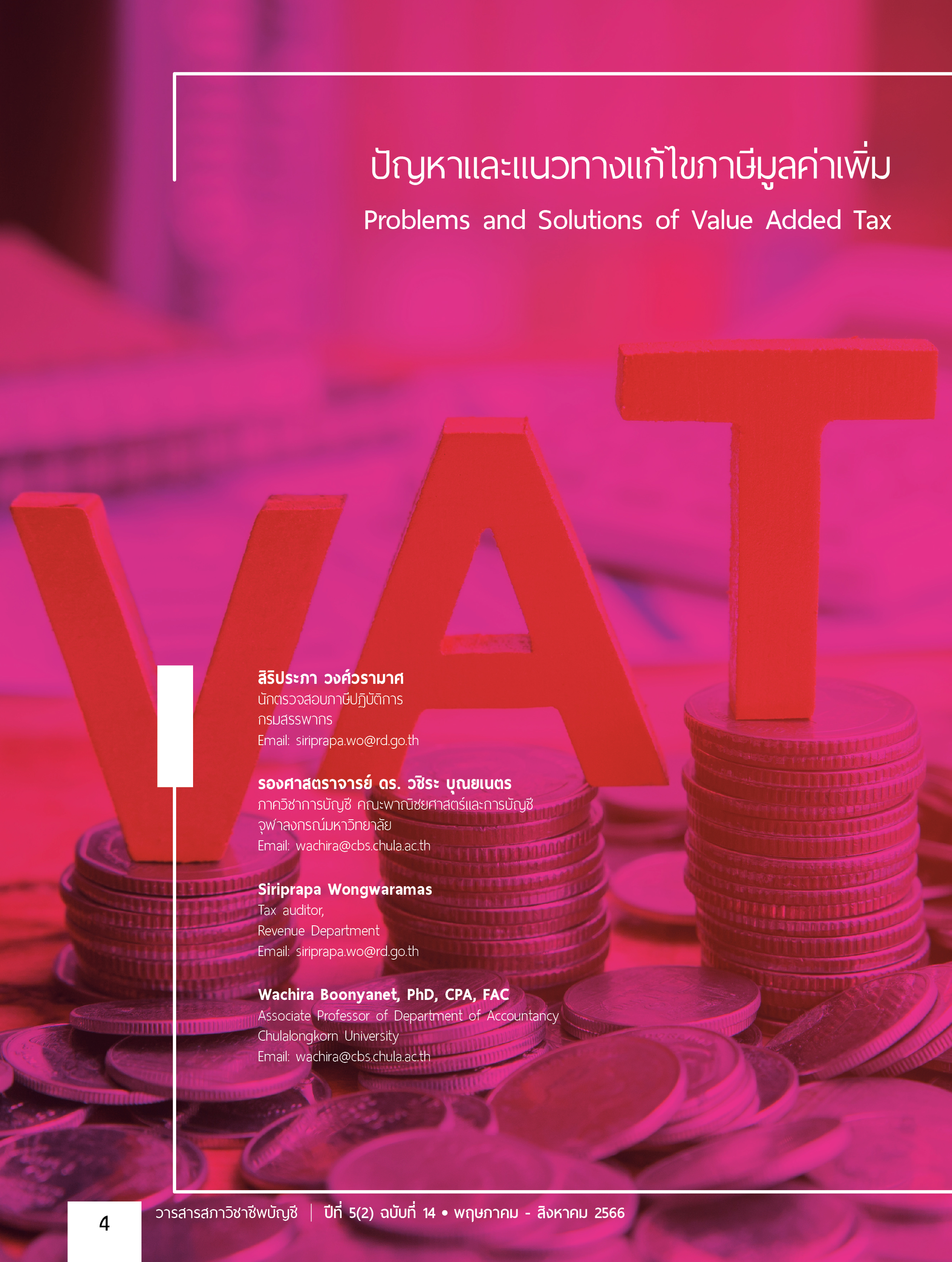ปัญหาและแนวทางแก้ไขภาษีมูลค่าเพิ่ม
Main Article Content
บทคัดย่อ
นับวันภาษีมูลค่าจะมีปัญหาที่เพิ่มขึ้นและซับซ้อนขึ้น และแนวทางการแก้ไขปัญหายังไม่มีทิศทางเดียวกัน การศึกษานี้มีวัตถุประสงค์เพื่อการศึกษาปัญหาและแนวทางการแก้ไขของภาษีมูลค่าเพิ่ม ผู้ศึกษาจึงรวบรวมปัญหาที่เกี่ยวกับภาษีมูลค่าเพิ่มที่เกิดขึ้นในปัจจุบัน เพื่อนำมาเป็นแนวทางในการสร้างแบบสอบถาม การศึกษาครั้งนี้เก็บข้อมูลจากนักบัญชี ผู้ตรวจสอบบัญชีและเจ้าของกิจการ จำนวน 150 ราย การวิเคราะห์ทางสถิติประกอบด้วยสถิติเชิงพรรณนา และสถิติเชิงอนุมาน
ผลการศึกษาพบว่า ผู้ตอบแบบสอบถามส่วนใหญ่ให้ความสำคัญกับแนวทางในการแก้ไขปัญหาของภาษีมูลค่าเพิ่มมากกว่าการระบุปัญหาของภาษีมูลค่าเพิ่ม สำหรับแนวทางการแก้ปัญหาของภาษีมูลค่าเพิ่ม ผู้ตอบแบบสอบถามให้ความสำคัญมากที่สุดเกี่ยวกับด้านการอบรมและประชาสัมพันธ์เพื่อพัฒนาความรู้เกี่ยวกับภาษีมูลค่าเพิ่ม ความสำคัญรองลงมา คือ การปรับปรุงกฎหมายและข้อบังคับ และเรื่องที่ผู้ตอบแบบสอบถามให้ความสำคัญน้อยที่สุด คือ ด้านการตรวจสอบภาษี สำหรับการระบุปัญหาที่เกี่ยวกับภาษีมูลค่าเพิ่ม ผู้ตอบแบบสอบถามส่วนใหญ่ให้ความสำคัญในด้านการจดทะเบียนภาษีมูลค่าเพิ่ม ในประเด็นที่เกี่ยวกับผู้ประกอบการกระจายรายได้ไปยังบุคคลหรือหน่วยงานที่เกี่ยวข้องเพื่อไม่ให้รายได้รวมเกิน 1.8 ล้านบาทต่อปี ความสำคัญรองลงมาคือ ด้านแนวทางการหลีกเลี่ยงภาษีมูลค่าเพิ่ม โดยใช้ภาษีซื้อจากรายจ่ายส่วนตัวมาเป็นของบริษัท และเรื่องที่ผู้ตอบแบบสอบถามให้ความสำคัญน้อยที่สุด คือ ด้านใบกำกับภาษี ที่ผู้ขายออกใบกำกับภาษีขายต่ำกว่าราคาจริง นอกจากนี้การศึกษายังชี้ให้เห็นปัจจัยที่มีผลต่อความสำคัญของปัญหาและแนวทางการแก้ไขของภาษีมูลค่าเพิ่ม ได้แก่ ประสบการณ์การทำงาน อาชีพและประเภทธุรกิจ การศึกษานี้ชี้ให้เห็นปัญหาเกี่ยวกับภาษีมูลค่าเพิ่ม และแนวทางการแก้ปัญหาซึ่งสามารถนำไปปรับใช้ได้ในอนาคต
Article Details
เนื้อหาและข้อมูลในบทความที่ลงตีพิมพ์ในวารสารสภาวิชาชีพบัญชี ถือเป็นข้อคิดเห็นและความรับผิดชอบของผู้เขียนบทความโดยตรงซึ่งกองบรรณาธิการวารสารไม่จำเป็นต้องเห็นด้วยหรือร่วมรับผิดชอบใด ๆ
บทความ ข้อมูล เนื้อหา รูปภาพ ฯลฯ ที่ได้รับการตีพิมพ์ในวารสารสภาวิชาชีพบัญชี ถือเป็นลิขสิทธิ์ของวารสารสภาวิชาชีพบัญชี หากบุคคลหรือหน่วยงานใดต้องการนำข้อมูลทั้งหมดหรือบางส่วนไปเผยแพร่ต่อหรือเพื่อกระทำการใดๆ จะต้องได้รับอนุญาตเป็นลายลักษณ์อักษรจากวารสารสภาวิชาชีพบัญชี ก่อนเท่านั้น
เอกสารอ้างอิง
Abdata, G. (2013). The practice of value-added tax and its problems in Jimma Zone Revenue Authority (Doctoral dissertation). Jimma University.
Al-Shammari, S. A. N., Ahmed, W. Y., & Al-Anbagi, A. T. (2021). Challenges of applying Value Added Tax to diversify the revenues of the State Treasury in Iraq _ Proposed mechanism.PalArch's Journal of Archaeology of Egypt/Egyptology, 18(4), 3610-3621.
Bari, E., Khan, T. I., & Ullah, M. S. (2022). The Value Added Tax (VAT) Improvement Program. Joint Agency Research Report, 19(1), 1-38.
Chuasarn, K. (2006). Enhancement of VAT Collection Efficiency, Lampang Area Revenue Office (Master Thesis). Chiang Mai University.
Cochran, W.G. (1977) Sampling Techniques. 3rd Edition, John Wiley & Sons, New York.
Fentaw, N. M. (2020). Challenge of Value Added Tax Collection in Amhara Regional State, Ethiopia (Master Thesis). University of Technology, Wuhan, P.R. China.
Kijphuangsuwan, P. (2011). Knowledge and understanding of entrepreneurs about being a registered entrepreneur. Value Added Tax of the Revenue Office in Bangkok Area 25 (Master Thesis). Silpakorn University.
Laijaroenwat, S (2008). Problems and Obstacles in Compliance with the Revenue Code: The Case of the Area Revenue Office Bangkok 9 (Master Thesis). Burapha University.
Longsakul, W. (2007). An Analysis of Tax Avoidance of People: A Case Study of the Revenue Office. Bang Rak 3 branch area (Master Thesis). Srinakharinwirot University.
Manakul, N. (2010). Fake tax invoices (Master Thesis). Thammasat University.
Markos, A. G. E. (2010). Value Added Tax (VAT) Administration and Revenue Performance: Challenges and Opportunities in the Mekelle Branch of the Ethiopian Revenue and Customs Authority (ERCA) (Doctoral dissertation). Mekelle University.
Pandey, B. K. (2021). Value Added Tax in Nepal: Challenges and Opportunities (Doctoral dissertation). Tribhuwan Multiple Campus Palpa, Nepal.
Rakkansilp, S. (2006). Behavior of Entrepreneurs in VAT Registered Business Organizations. Muang District, Buriram province that has the performance of the office staff. Area Revenue Branch City Buriram Province (Master Thesis). Buriram Rajabhat University.
Revenue Department. (2023). VAT. Retrieved from: https://www.rd.go.th/2596.html
Sampet, S (2008). Factors affecting measures to prevent and suppress counterfeit tax invoices: a case study of the Bangkok Area Revenue Office 22 (Master Thesis). Thammasat University.
Sharma, D. (2014). An Experience of Executing Value Added Tax (VAT) In Pokhara. Janapriya Journal of Interdisciplinary Studies, 3, 34-46.
Sittichum, N. (2006). A Study of Collecting Efficiency and Estimation of VAT Income of the Manufacturing Industry. Made in Lampang (Master Thesis). Chiang Mai University.
Sophapong, P., Rattanavibulsom, W., & Chanbanchong, C. (2017). Factors and guidelines for preventing tax evasion of companies listed on the Stock Exchange of Thailand (Doctoral dissertation). Naresuan University.
Srisawat, K. (2009). Knowledge and Understanding of Entrepreneurs in Becoming a Listed Entrepreneur. Value Added Tax of Chiang Mai Area Revenue Office 2 (Master Thesis). Chiang Mai University.
Thanasothon, T. (2019) Problems of VAT avoidance (Master Thesis). Thammasat University
Trachutham, C. (2016). Teachings on tax law. 11th edition. Institute of Legal Education of Thai Bar Association, Bangkok.
Yaran, C. (2005). Tax payment problems of VAT registered cooperatives in Chiang Mai (Master Thesis). Chiang Mai University.


